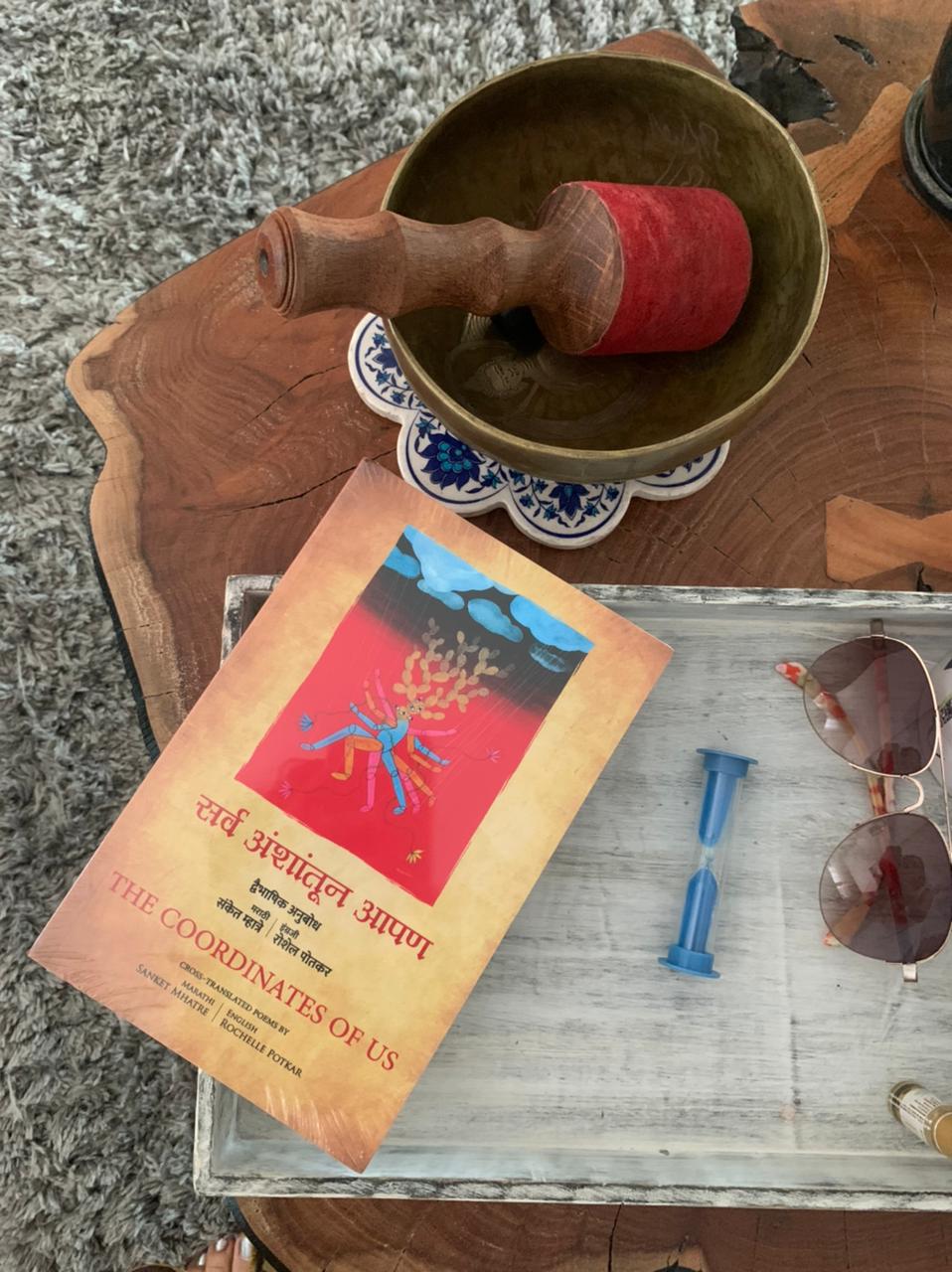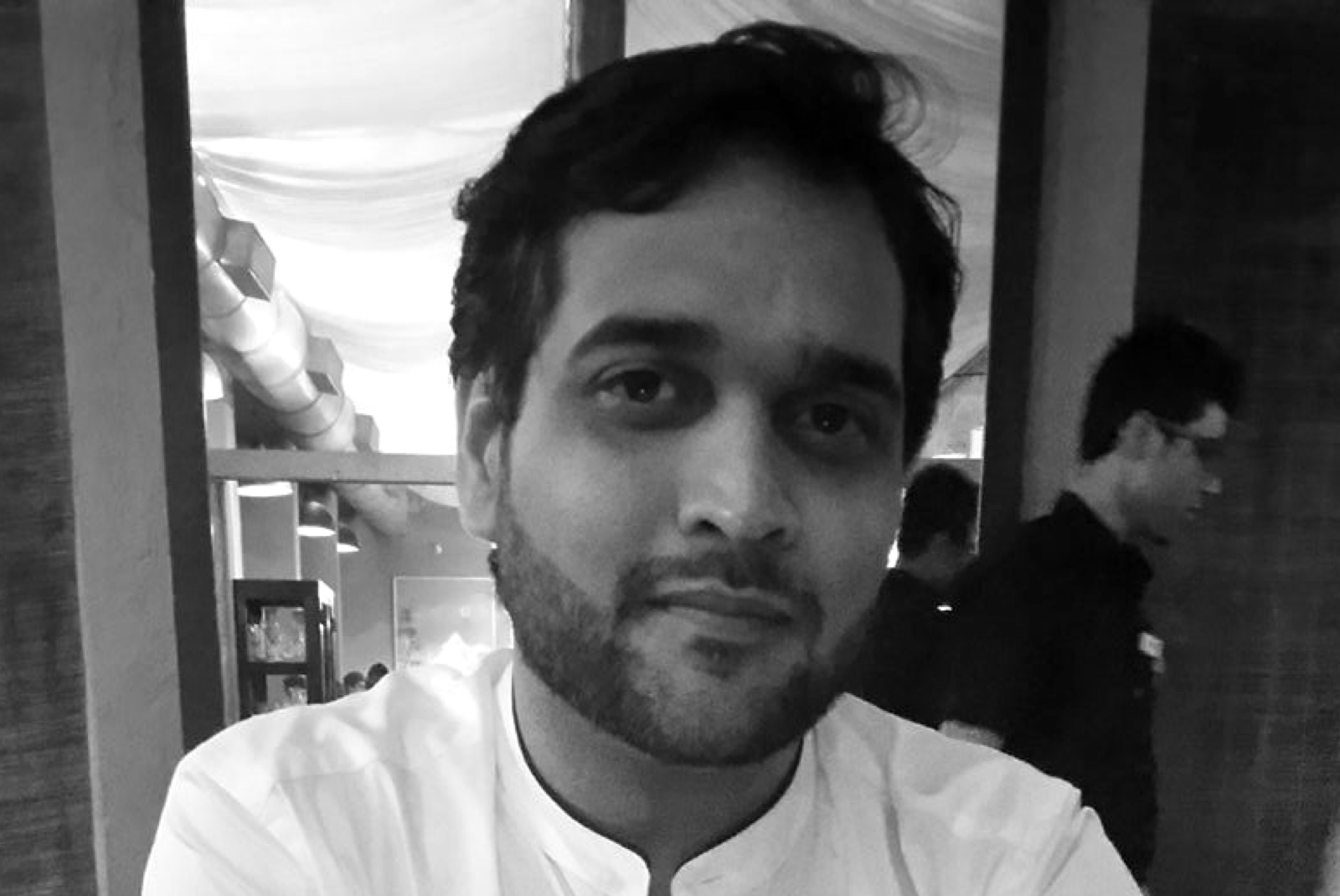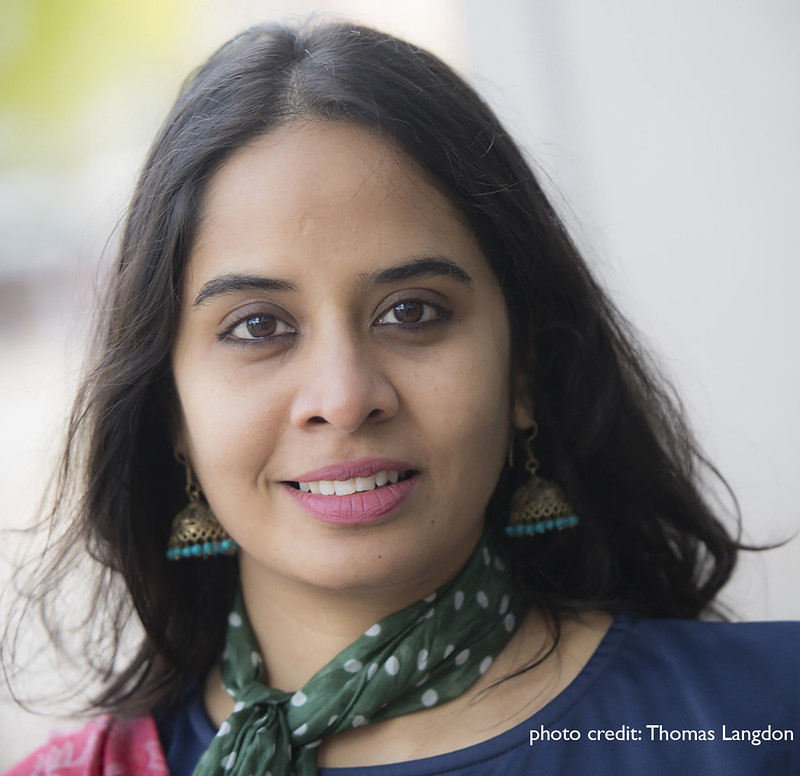Published September 5th, 2022
Review
by Kavita Parwani Talib
Behind every poem there is a secret message for someone and when you read Sarva Anshatun Appan/The Coordinates of Us, you might find a few of your lost coordinates resonating and at home with themselves. The poems that you read here hold joy, grief, and a lost longing. They spin a web around you as you read. There’s something about these poems and their cross-translations that transcend the voyage of life and its nuances, moments, and pauses; that punctuates life in its mundane mediocrity and show you the real magic in it. And that's what this book of cross-translated poems by Sanket Mhatre & Rochelle Potkar sets out to do. The book is an experiment and a one-of-its-kind at that, where two acclaimed contemporary poets have written poems and cross-translated the other’s work. It’s like reading two books at once.
Words are like nets – we hope they’ll cover what we mean, but we know they can’t possibly hold that much joy, or grief or wonder.
Jodi Picoult, Change of Heart.
The first part of the book contains Marathi poetry by Sanket Mhatre and translations of the same by Rochelle Potkar. The second part contains poems by Rochelle Potkar in English, translated into Marathi by Sanket Mhatre. The result is a spectacular array of literature that connects across two languages reiterating the essence of a lost truth: Poems aren’t just words, neatly strung, but an idea that transcends and shines through them. The collection has been divided into six sections under titles that indicate the eternality of the contexts. These sections represent different ages of humanity, right from Paleolithic, Mesolithic, Bronze Age to Iron Age and so on.
To simplify, Paleolithic refers to the absolute raw state where the author starts experiencing home, self, family and the first stirrings of love. As you move along, the poems progressively evolve into complex, finer themes; graduating systematically into community and social life, while your love as a theme keeps running like a finely woven thread. Love and its evolving journey moves through life experiences, affiliations and observations forms the crux of Mhatre’s poetry. It steadily advances into a maturity that comes from growing both personally and socially, simultaneously looking outwards at the city and beyond. “A kind of progression from self to unself; and ultimately a journey into oblivion… Niraakar”, in Sanket’s words. The poems do not follow a formal rhythm or geometry but transpire to touch you with a more untainted tone that moves you with meaning rather than meter and resonance rather than rhythm. These cross translated poems make you challenge what you may have accepted or swept under the carpet, opening a new gap of existence that have become history or remained as one.

Pictures emerge from his words, quickly yet finely crafted, throwing images of a little boy buying a Ganesha with his parents… or then a lover patiently searching cryptograms on his sleeping lover’s back trying to trace a path to her core. As any piece of good literature, the words linger long after you’ve finished reading. Easily Sanket Mhatre seemingly skims thru “Plaster of Paris – Kahi Tukde” etching out the ethos and the enigma of it all. The irony, the acceptance of life as it is in all its incongruity summed up with “Maticha Satya, matimadhe Purtoy…”, in a style that avoids sentimentality and depicts an inherent honesty (here and always, the italics are in the original). His words, in all their ‘careless’ banter say more than an in-depth conversation. A poem that leaves you re-reading it as you realize that a lot of our hand-me-down customs and beliefs that are as such an existential part of our life can easily dissipate in the ever-forgiving water… (and at times stay, and still get lost in the Chinese whispers of time.) Some lines from Aani tevha kalata/Expose — “…mazha chehra mazha rahatach nahin, toh virgul lagto tuzhya chehrat. Magh mee hee urat nahin, nahisa hoto… My face dissolves into yours, I turn into nothingness as if I never was.” A poem of love, depicting the soulmate as part of the self. Its easy narrative style gives it a life of its own and the simplicity of the translation brings the ode to life in the English version too. “…Hi sakalchi vel khup mahat vachi aahe mitra” reads itself with a deep sense of well-being and hope. The translations by Rochelle Potkar safe keep it like a fine veined leaf. Each line expressing a minute moment that comes alive and transforms the simple act of observing life as an art and a ritual. Triplaa lagnara Saaman is a poem made of goodbyes stitched into the skin into a permanent pattern of slowly increasing goosebumps. Each one leading to the final farewell. “What I leave behind is the certainty that I will not be returning / …Fakt theun jaatoi ti evdi jaaneev ki me parath yenaar nahin.” So final, hauntingly reminds you of Gulzar Saab’s “mera kuch saamaan,” the author’s personal favourite.
In Golden City, she dabbles in figurative writing soaring from a longing intimacy to the haunting beauty of the city around, “…and the desert battles its heat, cold and my longing.” The translation dives further into the ethos drowning you in sentences like, “Gurfatat jaato ankheen tujhya Madhur gandhit…”.

Some of the poems like Rape Fantasies captures the dichotomy of stereotypes and clichéd gender role play. And maybe this is the only intimacy “the reality of subjugation.” My favourite, is perhaps, Anthill. The purpose of an Anthill home is so that “we tame these organized creatures who represent the unruly elements of nature! No one can build or architect one. Ants are not easy listeners.” Each line, potent; a gem of a poem and the audacity of the idea. Something happens to it in Marathi, it becomes a love poem. How does Sanket Mhatre magic this, perhaps it is the inherent strength of the language? Another pick is the secret life of Selena. They say there are always three versions that each of us have: one that people see you as, one that you see yourself as and one that is the actual you. Selena adds one more to the list. “The shells of snails remain the same, our holiday homes too. Carefully enmeshing our dreams inside.” With these words, Rochele Potkar says it all, in a crispness that irons out romanticism and allows you to straighten your thoughts as you connect and disconnect almost simultaneously eschewing all the contradictions you carry. In Shunks, the lines, “Suicides hold the murmur of marine life. The ocean their last simpers. The diver himself going deaf from staying too long underwater, hearing all those secrets.” Deep, light, playful yet dark poetry that touches your core in a sudden, strong gasp. The words suddenly clasp on to your thoughts drowning whatever you were thinking before. Rochelle’s poems are immersive and have a vibrancy that cuts through the red tape and greet you face to face, holding up a mirror.

“A writer is a world trapped in a person” (quoting Victor Hugo) and this collective takes us into the impassioned world of Rochelle & Sanket’s poems. As a reader, it asks you, “Kaa nahin sangtoh ki khari heech dhaddhad, Jeh lihla aahe the fakt thokyancha bhasha antar…?Confess that the heartbeat is an actual poem? And what is written on paper, a mere translation…”
The poems aren’t elated pieces of work but tinged with droplets of melancholy, drip-dried with longing. They allow for interpretations and monologues that are easy to absorb and yet disturbing. They are centered around experiences of love and relationships. All loosely structured around a poignant intimacy that quickly encapsulates the transient mind states of these poets. They embrace the huge void that comes free with love and changes that inevitably plague it. Language is beautifully woven into a lattice capturing the essence of both their source and target meanings spoken as well as those left unspoken, urging you to navigate an articulated framework of coordinates finally reminding you, that poetry is a secret transaction, a voice responding to a voice with measured words and unmeasured silences.
“Many of us spend our whole lives running from feelings with the mistaken belief that you cannot bear pain. But you have already borne the pain. What you have not done is feel all you are beyond that pain,” says Kahlil Gibran. These poems allowed me to experience that freely; and examine who I am. It allowed me to draw and examine words from the fulcrum of my own perspective. The feeling would be distinct for every reader, but for me, it was unearthing a lost coordinate, somewhere between the mind and soul.
Dig deep, inside of you
Uncover, Unearth, reach and find
Secrets that kept you…
(And even those that are kept from you)
And in this process of renewal
Make new ground...
To earth you.
Nationality: Indian
First Language(s): Hindi
Second Language(s):
English
Supported by:


Comments on "Unearthing Coordinates Of A Lost Earth — A Review of "Sarva Anshantun Apan / The Coordinates Of Us" by Sanket Mhatre & Rochelle Potkar"
Please log in to submit a comment.
Login